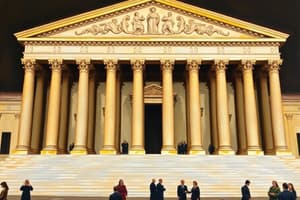Podcast
Questions and Answers
The Supreme Court is best characterized as:
The Supreme Court is best characterized as:
- An inferior Court
- An appellate court (correct)
- A Judicial Court (correct)
- A Federal court (correct)
In which jurisdiction would further review of a federal court decision fall under?
In which jurisdiction would further review of a federal court decision fall under?
- Superior
- Original
- State
- Appellate (correct)
An unanswered constitutional question about the judicial branch is:
An unanswered constitutional question about the judicial branch is:
- How to create a Supreme Court
- Who should appoint judges and justices
- How to create lower federal courts (correct)
- Who should approve judges
Why did the Constitution grant Congress the power to create 'inferior courts'?
Why did the Constitution grant Congress the power to create 'inferior courts'?
Which best defines the term jurisdiction?
Which best defines the term jurisdiction?
Which explains why Supreme Court Justices are given lifetime appointments?
Which explains why Supreme Court Justices are given lifetime appointments?
In terms of jurisdiction, the Supreme Court has:
In terms of jurisdiction, the Supreme Court has:
Which is the most likely reason the framers of the Constitution did not tell the judicial branch how to interpret the document?
Which is the most likely reason the framers of the Constitution did not tell the judicial branch how to interpret the document?
The diagram shows one way that cases reach the Supreme Court. The diagram is an example of:
The diagram shows one way that cases reach the Supreme Court. The diagram is an example of:
Which is a true statement about federal judges?
Which is a true statement about federal judges?
Flashcards are hidden until you start studying
Study Notes
Supreme Court Characteristics
- The Supreme Court is classified as a Federal court and an appellate court.
- It does not function as an inferior court or a judicial court.
Jurisdiction of Federal Court Decisions
- Further review of federal court decisions falls under appellate jurisdiction, not original or state jurisdictions.
Constitutional Questions
- An unresolved constitutional issue regarding the judicial branch is how to establish lower federal courts.
Creation of Inferior Courts
- Congress was granted the power to create inferior courts to maintain checks and balances and to prevent the Supreme Court from becoming overly powerful.
Definition of Jurisdiction
- Jurisdiction is defined as the authority granted to the judicial branch to make legal decisions.
Lifetime Appointments for Justices
- Supreme Court Justices are granted lifetime appointments to shield them from political pressures and influence.
Supreme Court's Jurisdiction
- The Supreme Court possesses both original and appellate jurisdiction, allowing it to hear cases from the beginning or upon appeal.
Framers' Intent on Judicial Interpretation
- The framers of the Constitution deliberately did not specify how the judicial branch should interpret the Constitution to allow for independent conclusion-making.
Appeals Process
- Cases reaching the Supreme Court typically fall under appellate jurisdiction, which involves reviewing lower court decisions.
Federal Judges Tenure
- Federal judges are appointed to serve lifetime terms, not limited terms such as five years, and they are not appointed by the Supreme Court or the Senate directly.
Studying That Suits You
Use AI to generate personalized quizzes and flashcards to suit your learning preferences.




